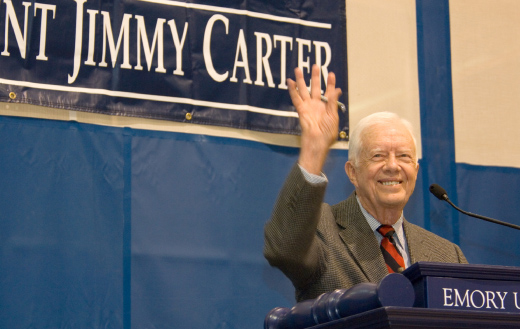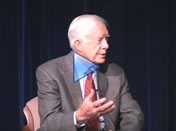Carter, uncensored

“He has seen the potential for Emory to become more active for people in developing nations, and he prods and nudges us to be active in global health.” —Emory President James Wagner
by Rhonda Mullen
Once a year, President Jimmy Carter looks forward to an event on the Emory campus with anticipation and a fair degree of trepidation—the Town Hall.
During the annual event, freshmen get to ask the President whatever is on their mind. Seemingly, no subject is off limits, and he has been quizzed on topics from the highly personal (his relationship with his father, questions about his wife) to the highly political (what he thinks of the current President).
“I never know what the question is going to be,” Carter says. “I’ve never failed to answer a question yet.”
Carter is generous with his time, says Emory President James Wagner. Once a month, for the past 30 years, he has met with an Emory president to catch up on developments at each other’s institutions. Carter also meets monthly for wide-ranging conversations with a small group of rotating Emory deans and faculty members. He has taken his tenure as a professor seriously, teaching in classrooms across the university and the health sciences. He is a fellow and honorary nurse of the Lillian Carter Center for International Nursing (named for his mother), and an endowed chair of mental health is named for Rosalynn Carter in the Rollins School of Public Health (RSPH), recognizing her advocacy of mental health issues.
“President Carter brings a real international political perspective to the campus, and he shares that with all of us,” says Wagner, who traveled with the Carters in 2005 to see outbreaks of trachoma in communities in Ethiopia.
Recently, students in Susan Butler’s Community Needs Assessment class at the RSPH got to visit with Carter. One MPH candidate, Lily Liang, was amazed at how much the President knew about communicable diseases. “What impressed me most,” she says, “was that President Carter shed tears when talking about how poverty deprived people of the rights to a healthy life and dignity.”
Carter was first recruited to Emory by then-University President James Laney, who went on to serve as ambassador to South Korea. Carter had one condition for joining the faculty: that he would not be censored. Laney agreed.
Since then, the connections between the Carter Center and Emory have grown into a rich partnership. Half of the trustees of each institution have to be approved by the other, and faculty experts from both campuses frequently collaborate. “It’s an exciting and valuable binding between a great university and the Carter Center,” Carter says.
Wagner describes Carter’s biggest role as the university’s conscience. “He has seen the potential for Emory to become more active for people in developing nations, and he prods and nudges us to be active in global health. That is one reason we made global health a big part of our strategic plan.”
Carter has been behind the Institute for Developing Nations, a MacArthur award-winning partnership between Emory and the Carter Center that is attempting to transform the way the world thinks about global poverty. He’s been the inspiration for the nursing school’s caregiver education program in Ethiopia. The Humphrey Fellows at the RSPH have him to thank for starting the international program in 1978.
During his affiliation, Carter has not shied away from difficult political questions such as the role of China in Tibet. When he published his controversial Palestine: Peace Not Apartheid, Emory offered speakers on both sides of the issue, in Wagner’s words, “a forum where people with violently opposed views could converse non-violently.”
In his annual Emory Town Hall, Carter may have gotten the toughest question yet. What is his favorite fishing stream? “I told them,” he says, with a slight pause. “But I didn’t tell them how to get there.” EH



